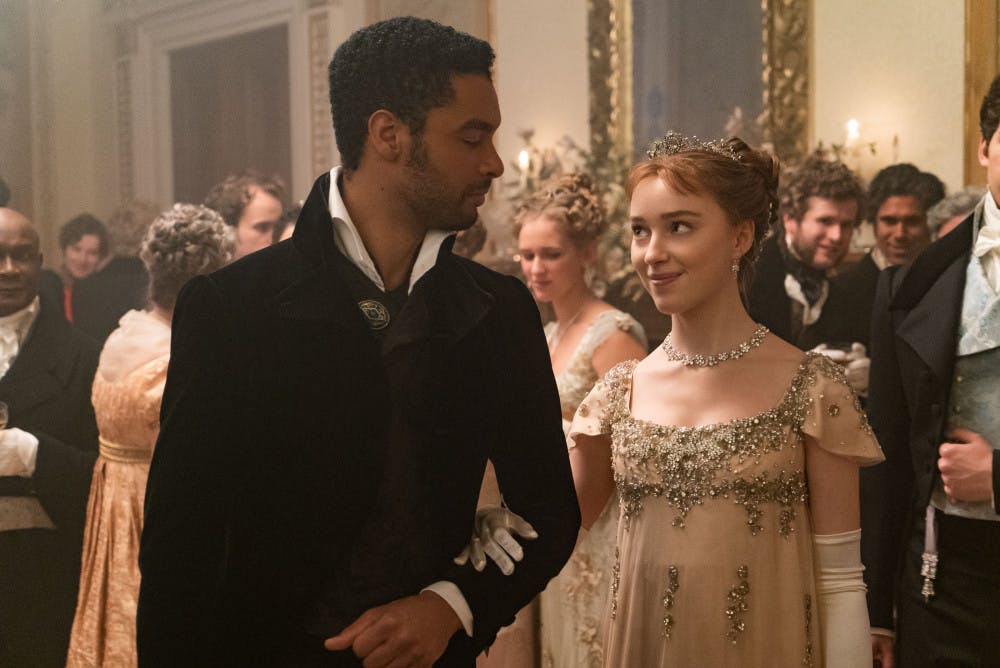In 1964, Supreme Court Justice Potter Stewart tried to define a legal threshold for detecting pornography: “I know it when I see it,” he wrote. Yet the average American television watcher these days doesn’t have the luxury of Justice Stewart’s discerning eye, and the border between intimate depictions of sex and mainstream television continues to blur. “Bridgerton,” created by Chris Van Dusen and produced by Shonda Rhimes, is interested in what television uniquely has to offer in its increasingly honest presentations of sex.
The eight-episode first season, released to Netflix Dec. 25 of last year, follows the lives of Regency-era London’s most talked about families and the ruthless means by which they remained floating above the rest of society. The show begins as their daughters are presented at court and thrust into a world of calculated marriages, vicious gossip and sex. Haunting the maneuvers of each high society household is the presence of barb-tongued Lady Whistledown, an anonymous writer bent on exposing any salacious rumor lurking about the city.
It might not come as a shock, but sex didn’t always air on television like it does now. Sex was all but erased in the first Golden Age of Television of the 1940s and 50s. Lucille Ball famously wasn’t allowed to say the word “pregnant” on “I Love Lucy,” and her husband Ricky slept in a separate bed on the show. The 70s brought liberation to the small screen, with series like “Charlie’s Angels” and “Maude” pioneering mainstream televised sexuality. A few decades later, prestige serials like “The Sopranos” and “Game of Thrones” often used explicit sex to attract more adult audiences and present an aura of maturity.
But what is the purpose of showing sex on the screen, other than to excite the viewer? Many detractors dismiss the phenomenon as morally corrosive, especially to younger audiences whose sexual education might consist of the late-night timeslot. Despite these naysayers, the rise of streaming comes with a growing trend of television series, like Hulu’s “Normal People” or Netflix’s “Sex Education,” that are interested in what frank discussions of sex and consent can do for our own cultural meditations.
The main attraction of “Bridgerton'' is that it rips free from the corset of conventions that typically constrain the period drama genre. Viewers are accustomed to watching their favorite historical characters remain fully clothed in their prim dresses and stuffy suits. The extended cut of 2005’s “Pride and Prejudice” displayed Elizabeth Bennet and Mr. Darcy sharing a single, chaste kiss and yet fans were up in arms. The show casts these traditional genre restrictions to the wind, presenting its characters having explicit sex anywhere that prying eyes won’t catch a glimpse. Such scenes are now dubbed as “steamy” or “intimate” in the age of televised sex.
And yet the series’ frequent inclusions of or allusions to sex aren’t simply a frivolous ploy to entice viewers. “Bridgerton” understands and dramatizes the importance that sex carries in our own adult lives. The drama uses the power of serialized storytelling to reflect back onto us the perils of ignoring sexuality’s vital societal role. The principal storyline follows the protagonist Daphne Bridgerton as she undergoes a sexual awakening in a society conspiring to keep her fully ignorant of her own body.
Daphne learns first of masturbation, then quickly advances to bearing a child by the finale. Up until her marriage, intimate relations are seen as threats to the lives of the well-to-do. A single kiss or a child out of wedlock can be weaponized to tarnish one’s reputation. Only when Daphne discovers the joy of sex — its power and its repercussions — is she able to exert her agency as an adult and her privileges as a duchess.
This isn’t to say that “Bridgerton” completely succeeds at providing a nuanced or consistent portrayal of sexuality. The series’ sixth episode includes a troubling and deeply problematic depiction of sexual assault and marital rape that isn’t properly questioned or recognized at its full gravity.
Whether or not it succeeds, “Bridgerton” is emblematic of the sweeping force within Western television that uses frank portrayals of sex to discuss the broad, often confusing role that sex plays in our lives. Just make sure you close the door before pressing play.

ADVERTISEMENT




